Tell me about it. I know it can be very frustrating.
You’ve spent many hours writing, rewriting, and rewriting once again, your CV; you also adapt it to each job offer you’re interested in and you write one cover letter after another, and nothing, not even a call for an interview.
Sometimes you think that no one needs a profile like yours, that you lack experience or that you are over qualified. You stress because you think you’ll never be able to find anything you really like.
You may have already read several articles on how to write a good resume and you are thinking “another one for the collection”. But this is not just another one, this one is different because you are going to learn how to do something very important in order to find the job of your dreams.
With this article you will learn to sell yourself. Yes, you heard me right, to sell yourself, and to do it very well.
And for that I’m going to explain to you how to apply copywriting techniques to your resume.
After all, copywriting serves to convince someone to buy something or make contact, so here it’s about convincing a company to hire you. Or at least to call you for an interview.
Copywriting also serves to stand out from the competition. Here you can use it to stand out from the other candidates.
I’ll tell you something quick about myself which is relevant for this topic.
Before deciding to write full time and started working as a freelance copywriter, I worked for 8 years in a corporation.
In those years I’ve seen, without exaggeration, at least 200 CVs and interviewed around 70 people even though I didn’t work in Human Resources but in Operations. The fact is that, either for my team or for other departments, I was often included in the selection process.
It’s very sad what I’m going to tell you, but most of the CVs and cover letters I came across were soporific. Reading them was a tedious process and if you add the fact that I always had a thousand other things to do, it got worse.
So when a few months ago I was invited to give a workshop on writing CVs I gladly accepted.
Preparing the workshop and when I was giving it, I realised that, without premeditation, one of my life’s missions was to put an end to boring and dull resumes and cover letters.
The workshop was a success, the attendees left with new ideas on how to better sell themselves and were eager to rewrite their CV to send it to companies.
Now I’m going to share with you what we saw in that workshop.
Shall we start?
We’re all in a hurry
It is the reality of current times, we read quickly and only what really interests us. And the same thing happens to recruiters.
Keep in mind that quite likely this person is not going to read your entire CV, they are going to scan it, and if they are not attracted by the information they see from the beginning, they will put it aside and will not read your cover letter.
Therefore you need to apply two very important concepts to make sure that person reads your CV: Be original and get straight to the point.
Do you know what elevator pitch is?
If you don’t know what it is, I’ll explain it to you right now:
It’s about imagining that you are in a lift with the person on whom the decision you need depends and you have to convince her that what you offer is worthwhile so that she wants to see you with more time and talk about that proposal more calmly.
In a lift you have a very limited time, just a minute or so. In your CV you are going to add your elevator pitch first of all, in the summary section. I know that many people omit this part, I really recommend to add it.
You have only about 5 or 6 lines to convince the recruiter that your proposal is worth it. In that space you have to tell him what you do, why you are the ideal person for that position and what sets you apart from other candidates.
You can also use this summary for your LinkedIn profile.
Sell Yourself
via GIPHY
To make the recruiter, who is reading dozens of CVs for the position you want, get interested in you, you have to be original.
It doesn’t matter if you are applying for a graphic designer position or you are an engineer, you have to get the attention of the person who is reading and convince her that you are the person she’s looking for.
Always try to visualize a single person and not a homogeneous mass of recruiters. Put a face to that one person, give him a name even, like copywriters do when writing for an imaginary customer; writing for one person makes the text more persuasive.
For your summary to be original and convince the recruiter that you are the perfect candidate for the role you have to apply 4 concepts.
Let’s look at each of them.
Run away from hackneyed expressions
There are certain expressions which everyone uses in their CVs that are a real pain. They are used so often that the person reading your CV skips them and doesn’t even register them; they have lost all meaning due to their excessive use.
They also make the reading process tedious and even take away the desire to live from those who are reading.
They are expressions like these:
– Responsible
– Organised
– Effective
– Motivated
– Extensive experience
– Troubleshooting
– Innovative
– Team player
– Creative
Instead of just listing those expressions that everyone uses, give examples, demonstrate and not just mention skills without adding more meat to the bone.
Really, try to avoid those words, look for synonyms or explain the same concept with more words.
Let’s see an example, instead of saying I’m responsible and a team player, you can say something like:
“I feel inspired when I’m working towards a common goal and I don’t like to leave things unfinished”.
With this phrase you are saying that you are motivated, that you like to work in a team and that you are responsible.
This is a phrase that the recruiter will read with interest because it isn’t a hackneyed expression.
You can also give examples of how you came up with a new solution to a given problem and with it you show that you are innovative; or write a very different and original summary to show that you are creative.
Let’s look at my summary as an example.
I’m a copywriter and content creator, so two of my qualities have to be creativity and versatility.
Instead of just listing those skills I say:
Bilingual Copywriter and Content creator for international and open-minded people. I write original and persuasive copy that provides businesses and professionals with a distinctive voice helping them to boost their sales.
I write about virtually anything for money.
For pleasure (and money sometimes), I write about travelling, art house films, arts exhibitions, new social trends, curious technology and digital marketing.
My writing references are Joe Sugarman, Henneke Duistermaat, Leo Tolstoy, Elena Ferrante and Josephine Hart. Just to name but a few.
Find your Unique Value Proposition
The unique value proposition is a classic and very important marketing concept. It’s about finding what makes a product or service unique.
Well, here it’s about finding and explaining what makes you unique as an individual which is directly related to what the company you want to work for needs.
Sit down and think about the qualities that make you unique, what fellow students, colleagues or relatives have told you on numerous occasions.
Perhaps your spelling is impeccable, or you express yourself very well or you always have a solution for each problem.
Don’t be afraid of showing what makes you unique.
Surely you have a lot to offer even if you don’t have a lot of work experience, think about your qualities and how to reflect them.
Let’s look at an example of a young candidate who doesn’t have a lot of work experience and is looking for his first important job.
We could write something like this:
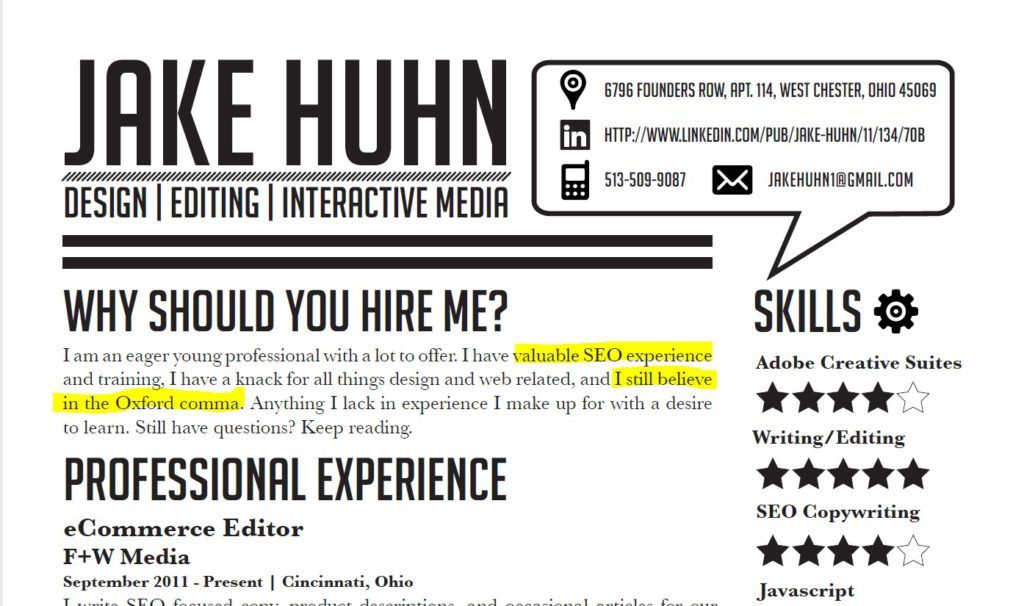
Your differentiation factor
This term also comes from marketing, but this time it comes from content marketing.
If your unique value proposition is those qualities that make you different from other candidates, the differentiation factor is the way you do things. Or rather, how could you help the company if they decide to hire you.
Here you have to demonstrate even more, instead of just listing.
Sit down and think about what kind of problems they might have in the area where you want to work and how you could help solve them. What kind of challenges they face every day and how you can make their lives easier.
Let’s look at a different example now. This would be that of an operations manager:
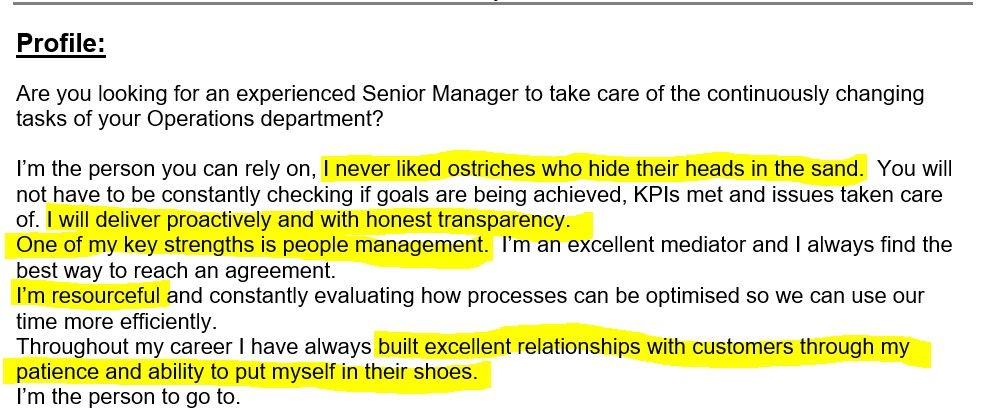
Instead of using hackneyed expressions, I’ve thought about the problems the direct manager might have and explained how I’m going to help her.
The direct manager wants to work with someone that she can trust, who doesn’t need too many instructions, someone who is honest and has a solution for each problem.
Note how I have introduced some information that provoke curiosity in the reader: “One of my strong points is people management”. The reader may want to know what the other strengths are and might invite you for an interview to find out about them.
Did you note that I also used a visual metaphor? An ostrich shows that the candidate is a responsible person who doesn’t hide when things go wrong. Visual concepts adhere better to people’s minds.
Show your personal side
Talking about our personal side will bring us closer to the person who is reading. If he likes us, we’ll have a better chance of him calling us for an interview.
Almost everything in this life can be learned, but if someone’s personality doesn’t match the nature of the position or doesn’t fit in the team, there’s nothing to do.
Personality is very difficult to change and it’s what is going to determine whether that person will be happy doing that job and if she would build a good relationship with the team members.
Talk about your hobbies, what interests you in life and in what you spend your time.
Many people add this section at the end of the resume, I advise you to put it on one side or even at the beginning so that it stands out.
It is very important that the person who is going to hire you feels a connection with you, which will then be consolidated or not, during the personal interview.
Your work experience. Show instead of just listing
Your experience is the next thing the recruiter is going to read after your summary and it’s the key to deciding whether or not to call you for an interview.
As I told you before, it doesn’t matter if you don’t have a lot of experience at first, what matters is how you show what you have.
I’ve seen a lot of CVs and almost all of them can be grouped into two groups:
– Those who limit themselves to listing the main tasks of each position like in a shopping list
– Those who tell you every single detail over pages and pages
But there’s a third possibility, and this is where your CV has to be.
Don’t limit yourself to listing the tasks you did in your previous work, give examples without going into too much detail.
When giving examples concentrate on one or two only, talk about some outstanding achievement or how you helped solve a certain problem at a given moment.
Let’s look again at the example of the operations manager.
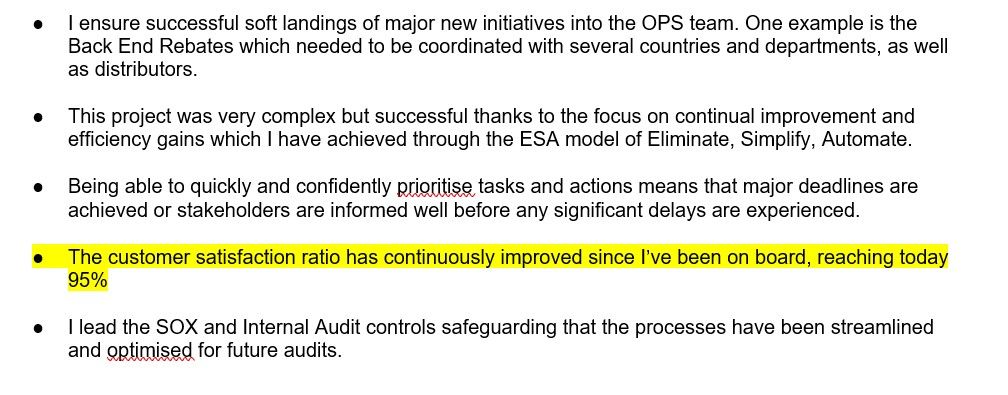
Keywords
Nowadays companies search for candidates with keywords. If these words are not included in your CV this one will not appear in the results.
Make sure you enter the keywords that appear in the job description; for example “SEO expert” or “Photoshop”, etc. You can include these words in the description of each work experience and in a list of your main skills.
Remember that it is very important to adapt your CV to each job offer.
Don’t get overwhelmed, it’s not about writing a new CV for each job, but about adapting some things to each job position, such as the most relevant work experience and the main skills.
Don’t lie, because you will end up getting caught.
Find a way to match your skills and work experience to the job you want without telling stories you can’t prove.
What you shouldn’t include
I know that nowadays it’s very easy to investigate what a person is like on social media but even so, in order to make the selection as objective as possible, I advise you not to include the following information:
– Photo
– Marital status
– Date of birth
– Nationality
If they like your CV let them find out these things in an interview, which is when you’ll have more chances of convincing them that you’re the right person.
Conclusion
Don’t be afraid to be different and challenge the status quo. In the end companies need people with new ideas who are genuine. To perform repetitive tasks we will have more and more software and artificial intelligence.
Show your most human and unique side.
By this I mean that you are free to design your CV, don’t give too much importance to the design and colours, unless you are looking for work as a designer, and concentrate on being clear and original in what you say and how you say it.
You can structure your CV in different ways but there are some basic rules.
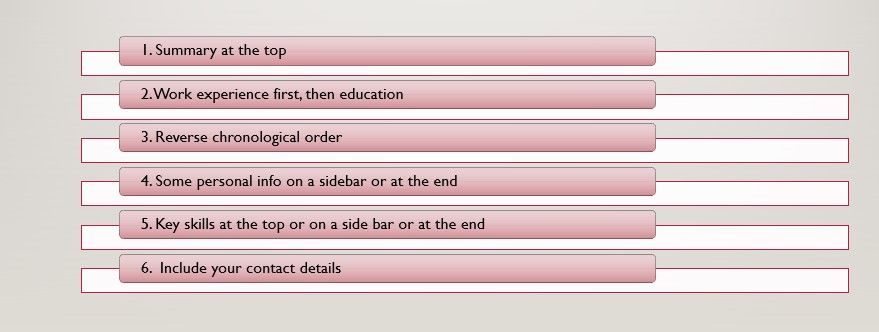
Bonus. Video
I couldn’t finish this article without talking about videos since an increasing number of companies are asking for a presentation video to accompany the CV.
Although this means more work for you, I understand why companies ask for it, it’s a better way to get to know the candidate.
The problem is that there are companies that ask for a specific video for the position with established questions to which you must answer, so you will have to make a new video for each occasion.
However, there are other companies that ask for a generic video only.
In both cases what you can have is the script ready so that you know what you have to say and save time. You can always use that script and adapt it to the questions asked by the company in question.
To write the script take the summary of your CV as a base and then add more information, the most important thing is to be yourself and to be honest.
Don’t recite your CV, instead of listing the roles and responsibilities you have had, take the opportunity to share an experience or quality about yourself that has special relevance to the position, but is not reflected enough in your CV.
For example, in a video I watched for a position, a young candidate talked about a summer job she had as a “bike tour guide”.
The video focused on this part of her experience and, through photos and stories, showed us that she was an energetic leader capable of creating a community through a shared experience.
This can be the structure of your video:
- Introduce yourself and briefly explain what you do
- Talk about why you are interested in that particular position and company (for adapted videos)
- Explain why you are perfect for the position (add your Unique Value Proposition and Differentiation Factor, focus on an example)
- Talk a little bit about your hobbies
- Try to sound natural, being a little nervous is fine, but you have to try to relax. Imagine you’re talking to a friend
- Be yourself.
Here there is a very original video, you don’t need to copy this example literally, but you can take notes and inspire yourself to make yours.
The tone depends on your personality, don’t try to be who you’re not.
I sincerely hope this article has inspired you to write a remarkable CV and get the job of your dreams.
Tell me about your experiences, I can’t wait to hear them 😊
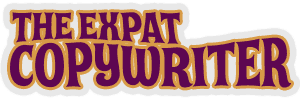

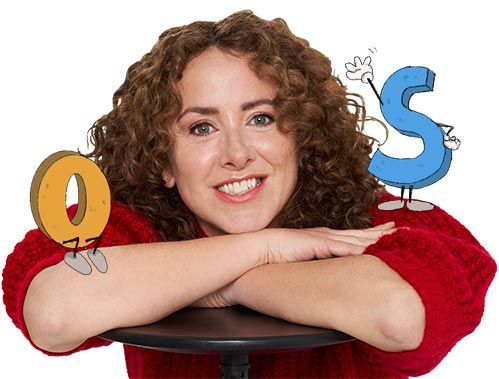
0 Comments